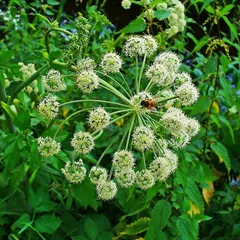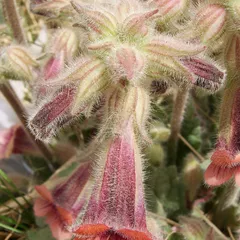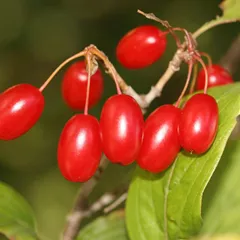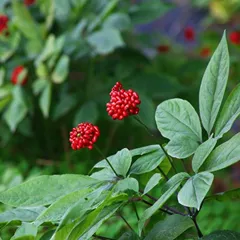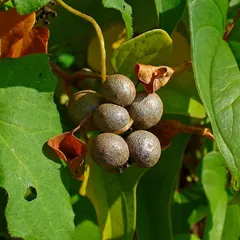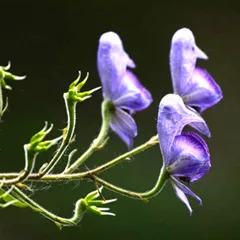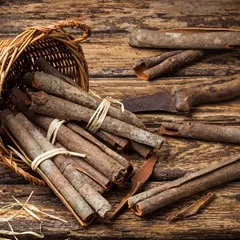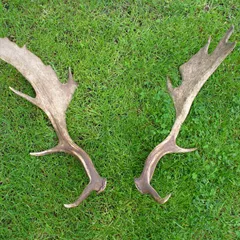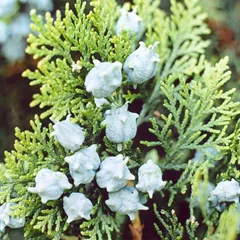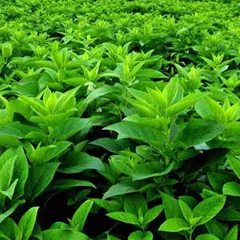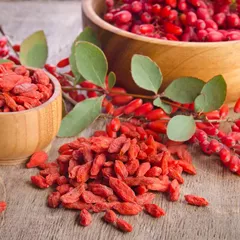Da Ying Jian
Da Ying Jian
Chinese: 大营煎
Pinyin: Dà Yíng Jiān
Other names: Big Nutritive Qi Decoction
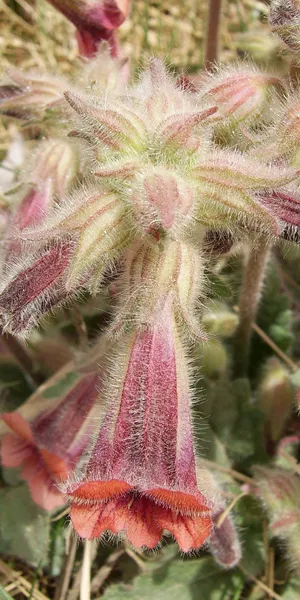
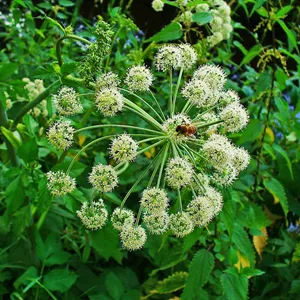
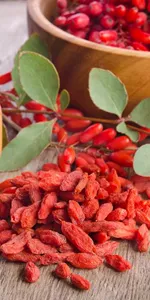
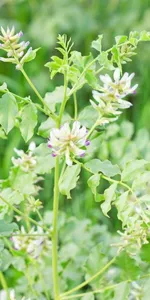
Da Ying Jian
Da Ying Jian
Chinese: 大营煎
Pinyin: Dà Yíng Jiān
Other names: Big Nutritive Qi Decoction
Number of ingredients: 7 herbs
Formula category: Formulas that tonify Blood
Conditions for which it may be prescribed: Late menstruation
- Tonifies Qi and Blood
- Expels Cold
Source date: 1624 AD
Source book: Collected Treatises of [Zhang] Jing Yue
The information provided here is not a replacement for a doctor. You shouldn't use it for the purpose of self-diagnosing or self-medicating but rather so you can have a more informed discussion with a professional TCM practitioner.
Da Ying Jian is a 7-ingredient Chinese Medicine formula with Prepared Rehmannia (Shu Di huang) as a principal ingredient.
Invented in 1624 AD, it belongs to the category of formulas that tonify Blood. Its main actions are: 1) tonifies Qi and Blood and 2) expels Cold.
In Chinese Medicine health conditions are thought to arise due to "disharmonies" in the body as a system. These disharmonies are called "patterns" and the very purpose of herbal formulas is to fight them in order to restore the body's harmony.
In this case Da Ying Jian is used by TCM practitioners to fight patterns like Cold in the Uterus. From a Western Medicine standpoint, such patterns can give rise to a range of conditions such as late menstruation for instance.
On this page, after a detailed description of each of the seven ingredients in Da Ying Jian, we review the patterns and conditions that Da Ying Jian helps treat.
The seven ingredients in Da Ying Jian

Shu Di huang is a king ingredient in Da Ying Jian. Like the name indicates, it means it has more power than other ingredients in the formula.
1. Prepared Rehmannia (Shu Di huang)
Part used: Prepared dried root tuber
Nature: Warm
Taste(s): Sweet
Meridian affinity: KidneyLiver
Category: Tonic herbs for Blood Deficiency
In general Shu Di huang's main actions are as follows: "Tonifies the Blood. Tonifies the Yin of the Kidneys."
In the context of Da Ying Jian, it is used because it nourishes Blood.

2. Dong Quai (Dang Gui)
Part used: Dried root
Nature: Warm
Meridian affinity: HeartLiverSpleen
Category: Tonic herbs for Blood Deficiency
In general Dang Gui's main actions are as follows: "Tonifies the Blood. Lubricates the Intestines. Relieve constipation. Promotes circulation and dispels Bi Pain. Reduce Dysmenorrhea and help with irregular menstruation."
In the context of Da Ying Jian, it is used because it nourishes Blood.
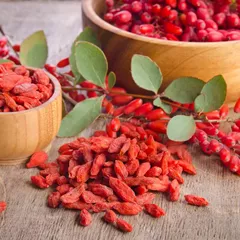
3. Goji Berries (Gou Qi Zi)
Part used: Dried ripe fruit
Nature: Neutral
Taste(s): Sweet
Meridian affinity: KidneyLiver
Category: Tonic herbs for Yin Deficiency
In general Gou Qi Zi's main actions are as follows: "Tonifies the Yin of the Liver and Yin of the Kidneys. Brightens the eyes. Moistens the Lungs."
In the context of Da Ying Jian, it is used because it nourishes Blood.
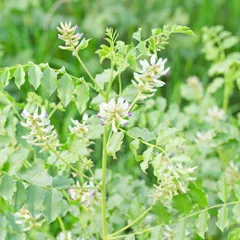
4. Liquorice (Gan Cao)
Part used: Dried root and rhizome
Nature: Neutral
Taste(s): Sweet
Meridian affinity: HeartLungSpleenStomach
Category: Tonic herbs for Qi Deficiency
In general Gan Cao's main actions are as follows: "Tonifies the Basal Qi and nourishes the Spleen Qi. Clears Heat and dispels toxicity. Moistens the Lungsexpel phlegm and stop coughing. Relieves spasms and alleviates pain. Harmonizes and moderates the effects of other herbs."
In the context of Da Ying Jian, it is used because it tonifies Qi to nourishes Blood.
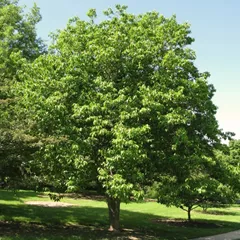
5. Eucommia Bark (Du Zhong)
Part used: Dried stem bark
Nature: Warm
Taste(s): Sweet
Meridian affinity: KidneyLiver
Category: Tonic herbs for Yang Deficiency
In general Du Zhong's main actions are as follows: "Tonifies the Liver and Kidneys. Calms ascendant Liver Yang (hypertension/high blood pressure). Calms a restless fetus."
In the context of Da Ying Jian, it is used because it tonifies Kidney Yang.
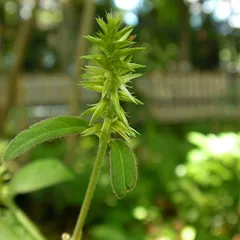
6. Achyranthes Roots (Niu Xi)
Part used: Dried root
Nature: Neutral
Meridian affinity: KidneyLiver
Category: Herbs that invigorate the Blood
In general Niu Xi's main actions are as follows: "Moves Blood and relieves pain in the raw state. Tonic to the Liver and Kidneys and strengthens the bones and sinews. Reduces Damp-Heat in the Lower Burner. Regulates the flow of reckless Blood caused by either ascendant Liver Yang or Yin Deficient Fire."
In the context of Da Ying Jian, it is used because it nourishes the Liver and invigorates Blood.
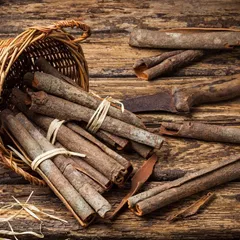
7. Cinnamon Bark (Rou Gui)
In general Rou Gui's main actions are as follows: "Warms the Spleen and Kidneys and tonifies the Yang. Expels Cold, Warms the meridians, promotes circulation of Qi and Blood and relieves pain. Used with tonics to assist in the generation of Qi and Blood."
In the context of Da Ying Jian, it is used because it expels Cold and tonifies the Fire of the Gate of Life.
Da Ying Jian is used to treat Cold in the Uterus
It's important to remember that herbal formulas are meant to treat patterns, not "diseases" as understood in Western Medicine. According to Chinese Medicine patterns, which are disruptions to the body as a system, are the underlying root cause for diseases and conditions.
As such Da Ying Jian is mostly used to treat the pattern "Cold in the Uterus" which we describe below.
But before we delve into Cold in the Uterus it is worth mentioning that it is often associated with the condition "late menstruation". Again it wouldn't be correct to say "Da Ying Jian treats late menstruation". Rather, Da Ying Jian is used to treat Cold in the Uterus, which is sometimes the root cause behind late menstruation.
Now let's look at Cold in the Uterus, a pattern that TCM practitioners commonly treat with Da Ying Jian.
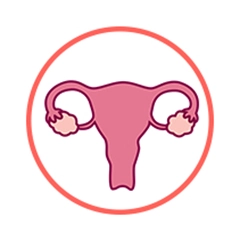
The Uterus is a so-called "Extraordinary" Organ. Learn more about the Uterus in Chinese Medicine
Cold in the Uterus
Pulse type(s): Deep (Chen), Soggy (Ru)
Tongue coating: Thin white coating
Tongue color: Pale
Symptoms: Fatigue Diarrhea Lassitude Sore back No period Sore legs Pale face Tiredness Amenorrhea Cold limbs Infertility Late period Loose stools Poor appetite Scanty periods Painful period Abdominal pain Feeling of cold Low sexual desire Frequent urination Dark colored blood Cold hands and feet Lower abdominal pain Irregular menstruation Pain relieved with heat Dark clots in menstrual blood Thin and watery vaginal discharge
Da Ying Jian is sometimes prescribed by TCM practitioners to treat Cold in the Uterus. This pattern leads to symptoms such as loose stools, poor appetite, fatigue and lassitude. Patients with Cold in the Uterus typically exhibit deep (Chen) or soggy (Ru) pulses as well as Pale tongue with white coating.
O'Cold in the Uterus' is one the most common TCM pattern for women. It can be responsible for many gynecological diseases such as menstrual cramps, irregular periods, late period, scanty period, amenorrhea, infertility, etc.
The Cold here mainly refers to Wind-Cold or Damp-Cold which can invade the... read more about Cold in the Uterus
Formulas similar to Da Ying Jian
Dang Gui Di Huang Yin is 71% similar to Da Ying Jian
Da Bu Yuan Jian is 62% similar to Da Ying Jian
You Gui Wan is 50% similar to Da Ying Jian
Bai Zi Yang Xin Tang is 44% similar to Da Ying Jian
Zuo Gui Yin is 43% similar to Da Ying Jian
Ren Shen Dang Gui Tang is 43% similar to Da Ying Jian

